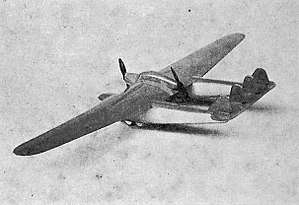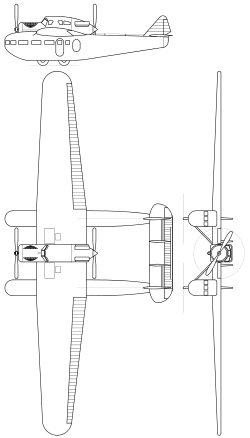Blériot 125
The Blériot 125 (or Bl-125) was a highly unusual French airliner of the early 1930s. Displayed at the 1930 Salon de l'Aéronautique in Paris, it featured accommodation for twelve passengers in separate twin fuselages. Between them, these pods shared a tailplane and a high wing. The centre section of wing joined the fuselage pods and also carried a nacelle that contained an engine at either end and the crew compartment in the middle. When flown the following year, it displayed very poor flight characteristics and although attempts to improve it continued on into 1933, certification could not be achieved and the sole prototype was scrapped the following year.
| 125 | |
|---|---|
 | |
| Wind tunnel model | |
| Role | Airliner |
| Manufacturer | Blériot |
| Designer | Leon Kirste |
| First flight | 9 March 1931 |
| Status | scrapped |
| Number built | 1 |

Specifications
General characteristics
- Crew: two pilots and one navigator
- Capacity: 12 passengers
- Length: 13.83 m (45 ft 4 in)
- Wingspan: 29.4 m (96 ft 5 in)
- Height: 4.0 m (13 ft 1 in)
- Wing area: 100.0 m2 (1,076 sq ft)
- Empty weight: 4,440 kg (9,789 lb)
- Gross weight: 7,260 kg (16,006 lb)
- Powerplant: 2 × Hispano-Suiza 12Hbr , 410 kW (550 hp) each
Performance
- Maximum speed: 220 km/h (137 mph, 119 kn)
- Range: 1,000 km (621 mi, 540 nmi)
gollark: Which I suppose is just "punish less" but oh well.
gollark: They do do rewards via the weird "tax deductions" thing, I vaguely heard about.
gollark: April Fool's idea for next year for Mark Zuckerburg: accidentally reveal true lizard/android form in some popular event on March 29th or something, then frantically try and claim it's an April Fool's joke messed up by time zones.
gollark: And make up various expansions for the acronyms and pick a different one each time.
gollark: Or something.
References
- Taylor, Michael J. H. (1989). Jane's Encyclopedia of Aviation. London: Studio Editions. p. 162.
External links
| Wikimedia Commons has media related to Blériot 125. |
- "Aircraft With Twin Cabins Carries Larger Loads", September 1931, Popular Mechanics
- "Cabins Under Wings Of Plane For Passenger Service" Popular Mechanics, August 1933
- "Report on Paris Air Show"l Flight 12 Dec 1930
This article is issued from Wikipedia. The text is licensed under Creative Commons - Attribution - Sharealike. Additional terms may apply for the media files.